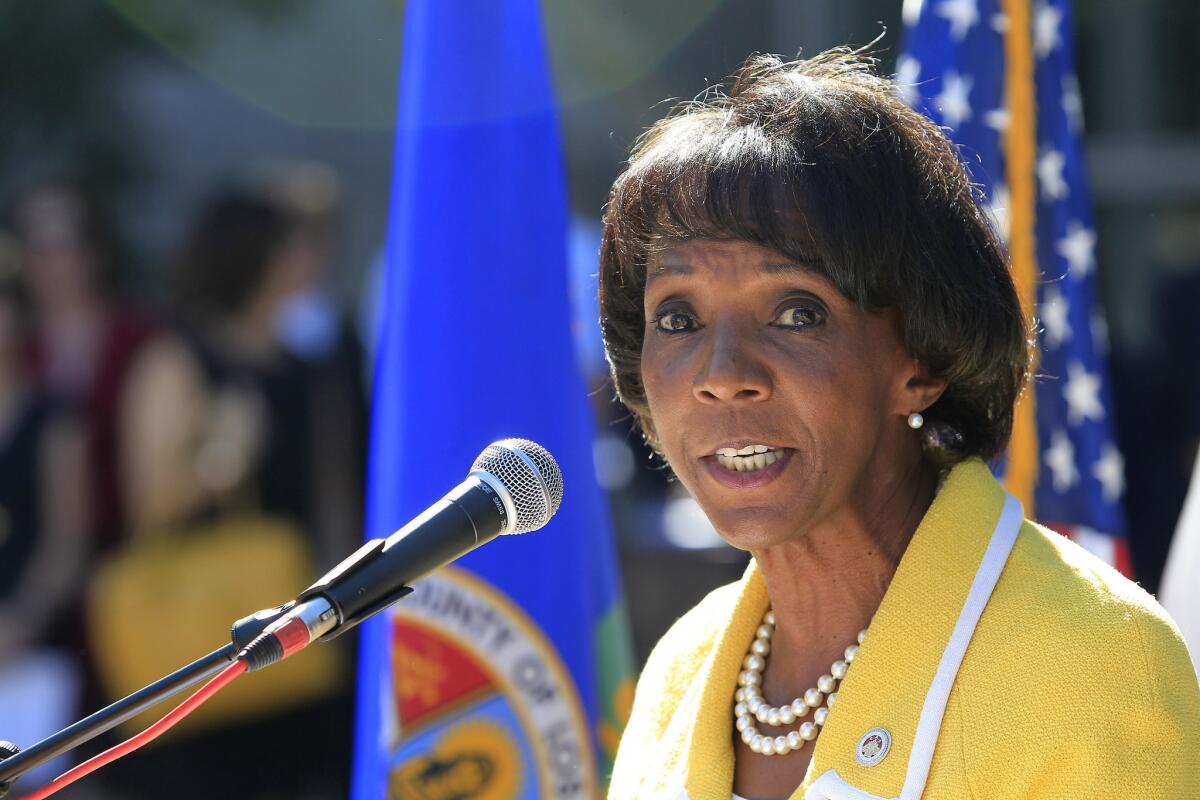Opinion: Lacey’s wrongful-conviction unit could be a step in the right direction

- Share via
The devil, of course, will be in the details, but Los Angeles County Dist. Atty. Jackie Lacey’s announcement that she wants to create an office to review wrongful conviction claims is welcome news.
As The Times pointed out in a story about the proposal, there have been three recent notable developments in wrongful conviction cases in Los Angeles: An $8-million settlement to Obie Anthony, imprisoned for 17 years for a murder he didn’t commit; the release of Susan Mellen, who spent 17 years in prison based on the testimony of a habitual liar; and a judge’s decision to toss out the 1979 conviction of Kash Delano Register.
All three cases were pressed by outside innocence projects, which have been instrumental around the country in revealing failings of the criminal justice system.
But there also has been a move by prosecutor’s offices to review cases that raise questions about the fairness of trials and possible miscarriages of justice, which have led to second chances for people wrongfully convicted in jurisdictions from New York to North Carolina to Texas. That there might now be such an effort in Los Angeles County -- which has sent more people to California’s death row than any other county -- could offer another layer of protection against errors.
How the office will work remains under wraps, but Lacey said she wants to staff it with three prosecutors, an investigator and a paralegal. And while the notion of a prosecuting office reviewing its own cases raises questions about objectivity and integrity, having such an office would be better than not having one. But how it will be organized and what freedoms it has to operate will be key.
So far this year, there have been 43 reported exonerations recorded by the National Registry of Exonerations maintained by the University of Michigan Law School, only six of which involved new DNA testing that cleared the convicted person. Nearly half of the cases -- 20 -- involved official misconduct, and 10 involved false confessions.
In a related development, The Washington Post recently reported that 26 of 28 forensic experts for the FBI “overstated forensic matches in ways that favored prosecutors in more than 95 percent of the 268 trials reviewed so far, according to the National Association of Criminal Defense Lawyers (NACDL) and the Innocence Project, which are assisting the government with the country’s largest post-conviction review of questioned forensic evidence.”
Of those pre-2000 cases, 32 resulted in death sentences, nine of which have already been carried out (five of the condemned died in prison). Three of the 32 death sentences came in unspecified California cases, and all remain alive. It’s not clear yet whether the flawed testimony was instrumental in the executions of innocent people, or, across the spectrum, led to wrongful convictions in non-death-penalty cases (there may have been other evidence).
As I’ve written before, a system that is this easily gamed should not end in executions. Beyond the moral failure of a government killing its citizens lies the even graver moral failure of executing innocent citizens. And even those wrongfully convicted of lesser crimes should have a mechanism for seeking a review of the process -- especially given the wrongful conviction cases that have come to light after court appeals have been exhausted. Lacey’s plan could be a positive step in that right direction.
Follow Scott Martelle on Twitter @smartelle.
More to Read
A cure for the common opinion
Get thought-provoking perspectives with our weekly newsletter.
You may occasionally receive promotional content from the Los Angeles Times.










